|
|

Twilight Time
Savant Blu-ray Review
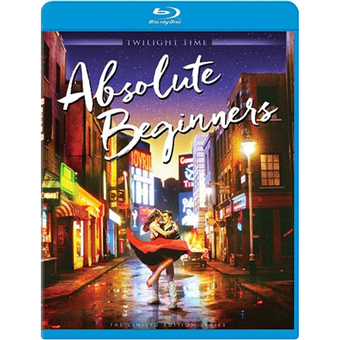
|
Absolute Beginners
Blu-ray
Twilight Time
Limited Edition
1986 / Color / 2:35 widescreen / 107 min. / Ship Date June 9, 2015 / available through Screen Archives Entertainment / 29.95
Starring Patsy Kensit, Eddie O'Connell, David Bowie, James Fox, Ray Davies, Mandy Rice-Davies, Eve Ferret, Tony Hippolyte, Graham Fletcher-Cook, Joe McKenna, Steven Berkoff, Sade Adu, Tenpole Tudor, Bruce Payne, Alan Freeman, Anita Morris, Paul Rhys, Julian Firth, Chris Pitt, Lionel Blair, Gary Beadle, Robbie Coltrane, Jess Conrad, Smiley Culture, Ronald Fraser, Slim Gaillard, Irene Handl, Peter-Hugo Daly, Amanda Jane Powell, Johnny Shannon, Sylvia Syms.
Cinematography Oliver Stapleton
Production Designer John Beard
Art Direction Stuart Rose, Ken Wheatley
Film Editors Richard Bedford, Michael Bradsell, Gerry Hambling, Russell Lloyd
Original Music Gil Evans
Written by Richard Burridge, Michael Hamlyn, Terry Johnson, Don Macpherson, Christopher Wicking from the novel by Colin MacInnes
Produced by Chris Brown
Directed by Julien Temple
|
|
|
|
|
Reviewed by Glenn Erickson
Music videos ruled between roughly 1983 and 1990, the gap between Michael Jackson's Beat It and the rise of Rap to the mainstream. One of the hottest music video directors in England was Julien Temple, who had gotten his start on film documenting the Sex Pistols and The Kinks. Goldcrest broke the bank to finance Absolute Beginners, a giant, gaudy musical in brilliant color and Super Techniscope. It was quite the buzz for awhile in Los Angeles, having a very brief theatrical run but playing quite a bit on the old "Z" cable channel, a home for hip movies that bombed in the theaters.
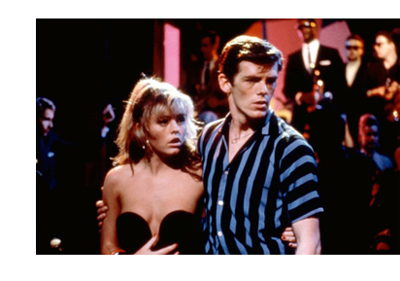
Temple was certainly ahead of the times, stylistically. The whole movie is choreographed; the dialogue scenes sometimes seem like interstitial pauses between visual flourishes. Temple certainly has enough variety in his musical numbers. Most prophetically, he opens the picture with a single-take moving camera shot that roams around his giant London street set for several minutes straight, setting up the 'world.' There are some disguised cuts in it, but it's still breathtaking.
The subject is youth and pop culture on the streets in 1958; the story comes from author Colin MacInnes, who wrote a trio of books documenting the "urban squalor, racial issues, bisexuality, drugs, anarchy, and decadence' of a lifestyle where teens and young adults had disposable income for the first time, and the economy was beginning to gear itself to their desires and tastes.
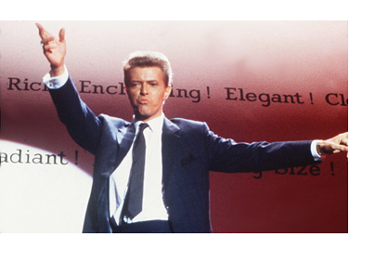
The night comes alive on the streets, where the connected as well as the wannabes flaunt their radical images and vie for attention. Our narrator Colin (Eddie O'Connell) flits through the center of it all, taking pictures that he hopes will capture the craze (as director Temple's films did for The Sex Pistols a decade and a half later). The other fifty or so characters are a giant ensemble of crazies, most with a goofy name. Each has something to sell, an ambition to pursue or a racket to work at.
The story, such as it is, isn't that much different than 1929's The Broadway Melody. Colin takes dirty pictures to make a living but yearns to be accepted as a photographic artist. His girlfriend Suzette, aka 'Crepe Suzette' (Patsy Kensit) is an assistant at fashion shows but yearns to burst forward as the personality of the decade, a singer, dancer, fashion maven, the works. She's seduced into becoming the trophy wife of fashion designer Henley of Mayfair (James Fox). A dandy's dandy, Henley sees Suzette's promise when she starts a sensation by hijacking one of his fashion shows. Suzette thinks she'll rocket skyward, but Henley really wants to eliminate a competitor.
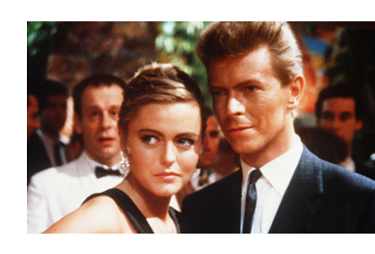
Meanwhile, Colin helps the flashy agent Harry Charms (Lionel Blair) build up lame novelty rock singer Baby Boom (Chris Pitt), a pubescent would-be teen idol. Through Harry, Colin is wooed to work for Vendice Partners (David Bowie), a super-connected pop and business whiz that claims to have the answer for everything and everybody. Not only does Vendice want to stifle Colin's creativity, he's a partner in a real estate scheme to eject the black population of Notting Hill, to gentrify the place with a new expensive housing development. Vendice's partners hire Teddy Boy thugs to intimidate the black residents.
What's the movie like? Well, imagine Fellini's La dolce vita mixed with Val Guest's Expresso Bongo. 1 There are no calm scenes. To express the vitality and urgency of his characters, Temple keeps the camera moving at all times through crowds of eccentric supporting and bit players.
The music numbers often are like music videos, with club numbers, single dances and group choreography in the streets, and pop tunes. Jazz singer Sade Adu has a terrific bit in a club. The flashiest numbers begin with Suzette's first dance scene, where she flies around the floor in a big skirt á la Vera Day. Then Colin's dismal life at home with his promiscuous mother, becomes a song by Ray Davies of the Kinks. Playing Colin's father, Davies laments the state of the family and his diminished authority. The house is an 'exploded' view, with all the rooms laid out like cartoon panels. In the final act Temple stages a big fight with elements of dance that remind us of West Side Story. The choreography in general is clever and certainly energetic, if still mostly flash played for the camera.
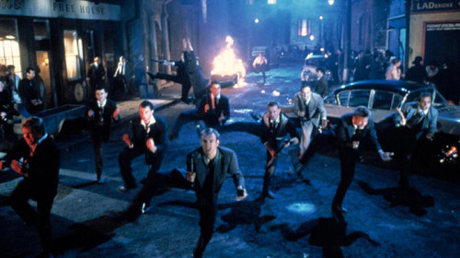
The most publicized number has David Bowie strutting on a giant typewriter keyboard, as part of his show to entice Colin into selling out, big-time. Temple must have wanted to touch all bases. This bit certainly appeals to the Busby Berkeley fans; Bowie looks like a gangster-businessman with vampire teeth.
Here's a round up of some of the crazy characters that intersect with Coin and Suzette's story: Colin's best friend, Jazz musician Mr Cool (Tony Hippolyte) has no choice but to get into the race riot. Wizard (Graham Fletcher-Cook) is a diminutive pickpocket and sneak thief who sides with the Teddy Boys. Various other friends are drug addicts, criminals, etc.; gay-boys abound, and 'Big Jill' (Eve Ferret) is an oversized and lovable lesbian. The names could could have been written by a Cockney Al Capp: Johnny Wonder, Flikker, Call-M-Cobber, The Fanatic, Fabulous Hoplite, Cappacino Man. Fashion critic Dido Lament (Anita Morris) pesters Mr. Henley, 'discovers' the exuberant Suzette, and tries to both lay Colin and get him to sell out. In case we aren't getting the message clearly, a major song is called "Selling Out."
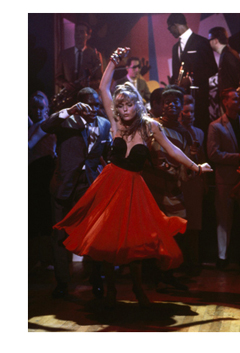
Is Absolute Beginners a good movie? It's certainly interesting. Patsy Kensit is fairly dazzling, a bit like a young Julie Christie with Shindig-worthy dancing skills. Eddie O'Connell is likeable and sincere. The movie is eye candy from one end to the other, a parade of color and costume creativity, flashy but not exaggerated editing, and the occasional snappy choreographic scene. Olive Stapleton's camerawork achieves some eye-catching lighting schemes, as Colin dances and prances around what seems an acre of back-alley sets. The songs are jumpy and fun, although not particularly memorable. The title tune is good. Sade is sandwiched in as added value, and her smoother delivery is a nice break from the hyperactivity around her. As for Ray Davies, it's nice to put a face and a personality with that great voice. We Yanks on this side of the pond mostly heard our British Invasion favorites, on the Top Ten radio stations.
Early on there is a brief Jets-Sharks type face-off between Mods and Trads. The film's historically accurate violent finish stages a clash between thugs and a new population of 'Commonwealth Immigrants,' from Africa, the West Indies and India, that had began pouring in starting in around 1955. The movie stages a large, partially musicalized race riot, with Blacks vs. paid-goon Teddy Boys. So Absolute Beginners makes a strong anti-racist statement as well. 2
Temple's show has a certain vibe that either hits or doesn't. There's a gay/bi/free lifestyle sensibility running through the show that certainly adds to its vitality. I'd have to say that one witnesses the film more than gets deeply involved. Straights like myself must concentrate to keep all the weird players differentiated, while the self-conscious formula romance pushes O'Connell and Kensit as bright and talented possible stars, without engaging us emotionally. If Absolute Beginners didn't take off when new it's not anybody's fault, as we all know that completely lame pop music movies have done extremely well. The timing, distribution and promotion must not have been there for this one.
The Twilight Time Blu-ray of Absolute Beginners will knock the eyes out of people who have only seen blah older cable TV showings, VHS tapes or the okay-but-no-cigar MGM DVD from twelve years ago. This must have looked incredible on a big screen, as the color and movement jump out at us. With the better definition we can admire the pre- swinging London fashions, where guys try to look like TV emcees and girls are halfway between crinoline-stuffed skirts and hip-chick mod fashions. The costuming bill for this show must have been astronomical. The color, the dazzle and all that intricate camerawork can't have been cheap either.
For extras Twilight Time offers only its Isolated Score Track, which for this film should be extra enough -- the 107-minute show must have a hundred minutes of music, and will make a great background concert track. Louis Falzarano's good design sense captures the feel of Absolute Beginners in the disc's cover imagery. Essayist Julie Kirgo makes a great case for the film's rebirth, and indeed asks why it wasn't a breakthrough hit in the first place. 1986 was a good year for things retro and camp - even high camp. Pee-Wee Herman was a hit for little kids. I can only think that the particular historical period in Brit teen culture didn't connect with the 1986 American audience.

On a scale of Excellent, Good, Fair, and Poor,
Absolute Beginners Blu-ray rates:
Movie: Very Good / Excellent
Video: Excellent
Sound: Excellent 5.1 DTS-HD MA
Supplements: Isolated Score Track, Julie Kirgo liner notes
Deaf and Hearing Impaired Friendly?
YES; Subtitles: English
Packaging: Keep case
Reviewed: June 22, 2015
Footnotes:
1. Not yet 'rediscovered,' Expresso Bongo is Val Guest and Wolf Mankowitz's look at the same pop scene pictured in Absolute Beginners, with Laurence Harvey as a pushy Jewish talent agent and Cliff Richard as a callow pop star. It's frenzied in its own way, with stylized, machine-gun dialogue. A big hit (in England), it helped everyone's career -- Mankowitz and Guest proceeded directly to another artistic and box office success, the science fiction film Day the Earth Caught Fire.
Return
2. Another good movie made at this time about race tensions in the 'expresso bongo' college art-student crowd, is Basil Dearden's Sapphire. And it has Barbara Steele in a small part, too!
Return

Text © Copyright 2015 Glenn Erickson
See more exclusive reviews on the Savant Main Page.
Reviews on the Savant main site have additional credits information and are often updated and annotated with reader input and graphics.
T'was Ever Thus.
Return to Top of Page
|




